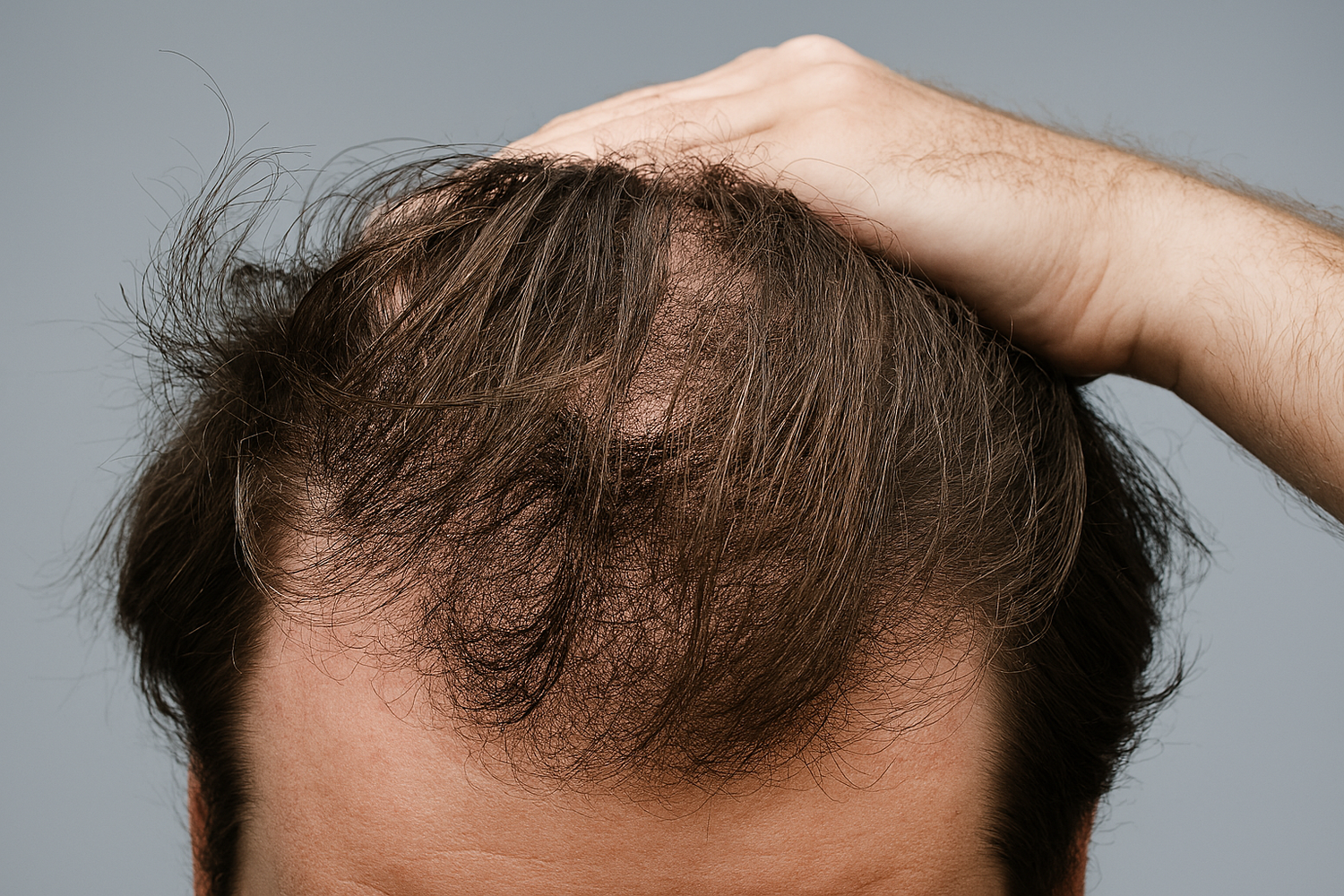You set out to manage your blood sugar and maybe shed a few pounds, not to question your reflection in the mirror. But now, with a noticeably thinner hairline, your confidence may feel unexpectedly shaken.
In most cases, hair loss associated with medications is often manageable and, in many instances, reversible. By understanding what might be causing it - whether it's the medication itself, changes in nutrition, or stress from rapid weight loss - you can take steps to slow or even reverse it.
Mounjaro is often prescribed for type 2 diabetes and is also known for supporting weight loss. However, as more men share their experiences, one concern keeps emerging: hair loss. Though not widely reported in clinical trials, the number of personal accounts is growing.
This blog explores what we currently know about does mounjaro cause hair loss, what might be causing it, and most importantly, what you can do next.
What Is Mounjaro and How Does It Work?
Mounjaro, also known as tirzepatide, is a medicine used to treat type 2 diabetes. It is part of a class of medications known as GLP-1 receptor agonists. These drugs lower blood sugar levels and are now also being used for weight loss. Mounjaro is given as a weekly injection and is often prescribed when other treatments are not working well enough.
The medicine works by copying the actions of two natural hormones in the body: GLP-1 and GIP. These hormones control how the body handles sugar after eating. They tell the pancreas to release insulin, which helps lower blood sugar levels. Simultaneously, they decrease the speed at which the stomach empties and help diminish appetite, making it easier to eat less without feeling deprived.
As a result, many people taking Mounjaro start to lose weight gradually. The medicine helps people feel full with smaller portions, resulting in a reduction in calorie intake. This process takes time, but it can lead to steady weight loss when combined with healthy habits.
Mounjaro is similar to drugs like Ozempic and Wegovy, which also help manage blood sugar and support weight loss. However, Mounjaro works on two hormones, rather than one. Some people see better results with it, but responses can differ from person to person. This might explain the variation in results.
Because the medicine affects appetite, digestion, and hormones, it can have effects beyond blood sugar control. Doctors monitor these changes to ensure that treatment is safe and effective for each individual.
Can Mounjaro Cause Hair Loss? What Science Says
Hair loss is not listed as a known side effect of Mounjaro by the manufacturer. Clinical trials did not report it as a common issue. However, many people using Mounjaro have noticed their hair thinning after starting the medication. These reports are often found on medical websites, forums, and patient support groups. These repeated accounts have raised valid concerns about Mounjaro's side effects, such as hair loss.
Some medical sources have addressed these reports. According to Drugs.com, user experiences have included hair loss, though it is not considered a primary side effect. However, a 2022 clinical study reported that alopecia occurred in 4.9% to 5.7% of those using a 5 milligram to 15 milligram dose of Mounjaro, compared to 0.9% of people using the placebo. This suggests that while uncommon, hair loss may still occur in a small number of users.
To date, no research has proven that Mounjaro directly causes hair loss. But many doctors believe that certain changes triggered by the drug may play a role. For example, losing weight quickly can result in lower levels of essential nutrients. The body also reacts to weight loss as a stress signal. When this happens, hair can enter a resting phase and begin to fall out more than usual.
Why Hair Loss May Happen on Mounjaro: Possible Causes
Hair loss while using Mounjaro can be frustrating, especially when the medication is helping with weight or blood sugar goals. While the drug itself does not directly damage hair follicles, the changes it triggers in the body may lead to temporary hair thinning. Some of the possible causes are:
-
Telogen Effluvium from Weight Loss
Telogen effluvium is one of the common causes of sudden hair loss. It happens when a large number of hairs shift from the growing to the resting phase. A few months later, this causes noticeable shedding.
Rapid weight loss also triggers telogen effluvium. Mounjaro often causes a reduced appetite, which can lead to weight loss fairly quickly. When the body sheds weight fast, it can treat this change as physical stress. The stress response causes the body to pause hair growth, allowing it to focus on more vital functions.
This kind of hair loss typically begins two to three months after the weight loss starts. It is not permanent, and in most cases, hair begins to regrow once the body stabilizes. However, seeing clumps of hair fall out can still feel alarming.
-
Nutrient Deficiencies
Hair depends on regular intake of nutrients to stay healthy. When someone eats less, they may not get enough vitamins or minerals.
Mounjaro often leads to smaller meals, resulting in fewer overall nutrients. This results in lower levels of iron, zinc, biotin, and protein, all of which play a direct role in hair strength and growth. Even a mild deficiency can impact hair growth. That is because the body prioritizes vital organs over hair, so when resources are low, hair growth is one of the first functions to slow down.
-
Hormonal Changes
Mounjaro alters how the body regulates insulin and blood sugar by interacting with natural hormones such as GLP-1 and GIP. These hormones regulate appetite and metabolism. While this helps with weight and diabetes, hormonal shifts can also affect other systems.
Hormones partly control hair growth. Any change in hormone levels can affect the hair cycle. In some individuals, this hormonal imbalance may result in hair shedding or slower hair growth. The effect is not the same for everyone. Some people are more sensitive to hormone shifts and may notice hair changes sooner.
-
Emotional Stress
Hair loss can also come from emotional or mental stress. This can include stress related to health, appearance, or life changes that occur during weight loss. Even positive change can cause emotional strain if it happens quickly.
Stress also affects the nervous system, which, in turn, influences hormone levels and bodily functions. For people on Mounjaro, the stress may come from seeing changes they were not prepared for, such as rapid body changes, new eating patterns, or fear of long-term side effects like hair loss.
Summary of Causes
-
Telogen effluvium is caused by rapid or unexpected weight loss.
-
Inadequate intake of key nutrients, such as iron, protein, biotin, and zinc, can contribute to hair loss.
-
Hormonal shifts may alter the natural hair cycle.
-
Emotional or psychological stress from body or lifestyle changes can impact hair growth.
Who's Most at Risk?
Not everyone taking Mounjaro will experience hair loss. However, some people are more likely to notice thinning based on how their body responds to change.
People who lose weight quickly are among those most likely to experience hair shedding. Rapid weight loss is a well-known trigger for telogen effluvium. Even when weight loss is expected, the sudden change can signal stress to the body.
Those following strict diets or eating much less due to reduced appetite may also be at higher risk. Limited meals can also reduce the intake of essential nutrients, all of which are crucial for hair growth.
Stress is another key factor. Ongoing mental or physical stress, including the pressure of managing a chronic condition or adapting to body changes, can affect hair health over time. Additionally, genetics also matters. People with a family history of early hair thinning are more likely to notice changes when stress, weight loss, or nutritional issues are present.
These factors often overlap. For example, someone who is losing weight quickly and under stress may also be eating less as a result. Together, these conditions increase the likelihood of hair loss.
How Long Does Hair Loss Last After Mounjaro?
Hair loss after starting Mounjaro is usually short-term. In most cases, it happens due to telogen effluvium, a common response to stress or fast weight loss. This type of hair shedding typically begins two to three months after the trigger and may persist for approximately three to six months.
However, the hair usually grows back once the body adjusts. The hair roots are still alive. They just pause for a while. Once the body feels more stable, whether from balanced eating, reduced stress, or slower weight loss, hair can begin to grow again.
Regrowth speed varies from person to person. Age, genetics, and how early someone supports their body through diet or stress care all make a difference. Some people may see fuller regrowth sooner than others.
Although Mounjaro hair loss can feel alarming at first, it is often temporary. With time, care, and patience, most people notice gradual improvement.
What You Can Do to Prevent or Reverse Hair Loss
Hair loss during Mounjaro use may feel upsetting, but there are simple ways to support hair regrowth. Start by focusing on your diet. Hair is made mostly of protein, so eat enough of it each day. Try to include foods like eggs, chicken, lentils, or fish. These help your body build and repair hair.
Some people also benefit from taking supplements. Biotin, vitamin D, iron, and zinc are linked to healthy hair growth. If you are eating less due to reduced appetite, you might not be getting enough of these nutrients. Consult your doctor before adding any new supplements, especially if you are taking other medications.
Stress also affects hair. Poor sleep, worry, or big life changes can add to the problem. To help your body recover, try simple habits like regular walking, breathing exercises, or getting enough rest at night. Even small efforts can help lower stress over time.
Additionally, using hair products designed for men can also make a difference. Look for shampoos and scalp treatments that contain ingredients such as caffeine or saw palmetto. These can support hair strength and reduce breakage or shedding.
Taking these steps may not stop hair loss overnight, but they support healthy growth. If you notice the problem worsening or lasting too long, it's time to consult a doctor. They can help you find the cause and suggest other options if needed.
Spartan's Hair Loss Solutions for Men
Try Spartan offers hair care made specifically for men. The brand focuses on helping men who are dealing with hair thinning, especially when it happens during changes like weight loss or using medications such as Mounjaro. Spartan keeps things simple and uses ingredients that support hair from the root.
If you are seeing hair changes while on Mounjaro, the Spartan Hair Regrowth Kit is a good place to begin. It includes shampoo, conditioner, and a root spray. These products work together to support scalp health and reduce shedding. The formulas include biotin, DHT blockers, and other ingredients that help protect and strengthen hair.
You can also buy single products like the Root Activator Shampoo or Growth Serum. But many men choose the full bundle for better value and results. Using the full set provides daily support in a routine that is easy to follow.
Spartan products fit into your daily haircare routine without requiring extra work. The shampoo and conditioner are used like regular hair care, and the spray takes just a few seconds to apply. You also get a satisfaction guarantee if the products do not meet your needs.
If you're ready to take a simple step toward hair support, Spartan makes it easy with products specifically designed for men. Try the following products to control your hair loss:
When to See a Doctor or Specialist
Most hair loss from Mounjaro improves with time, but some cases need medical attention. If the shedding lasts more than six months, it may not be temporary. Long-term hair loss can indicate another underlying issue that requires medical attention.
You should also see a doctor if hair loss comes with other signs. Feeling tired all the time, having pale skin, or noticing changes in nails could mean low iron or thyroid problems. These issues often affect hair and may not improve without treatment.
If your hair does not begin to grow back after a few months, it is a good idea to speak with a specialist. A doctor or dermatologist can look for vitamin shortages, hormone changes, or scalp conditions that may slow growth.
Getting help early can prevent the problem from getting worse. A simple exam and test can often lead to clear answers and helpful steps.
Conclusion
Hair loss from Mounjaro can feel discouraging, but it often improves with time. For many men, shedding is temporary and often linked to weight loss, reduced nutrient intake, or stress. These changes affect how the body supports hair, but the roots usually stay healthy and can grow again.
With the right care, you can take steps to slow hair loss and support regrowth. Eating enough protein, taking key vitamins, and using proven hair products can help your body recover. These changes do not work overnight, but they can build progress over time.
It is also helpful to lower stress and keep track of any changes. This gives your body a better chance to heal and grow stronger hair. Even small efforts each day can lead to better results in the long run.
Do not wait for the shedding to get worse. Explore Spartan's hair care products, specifically designed for men, and start caring for your hair today.



